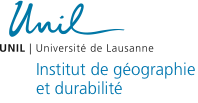Institute of Geography and Sustainability of the University of Lausanne
Research projects
ESPPACE project: Evaluation and monitoring for participatory processes in river management
| Research fields |
Margins, environment, landscapes Water Resources Management Water Resources Management |
| Keywords |
Risks management Vernacular knowledge Risk validation Participatory processes Watercourse management Flood risk |
| Funding | Federal Office for the Environment (FOEN), Flood Protection Section |
| Duration | Juin 2013 - December 2016 |
| Website | |
| Researchers |
Reynard Emmanuel (Supervision) [web] [email] Lane Stuart (Supervision) Utz Stephan (Doctoral student) |
The success of a river management project is assessed with the achievement of pre-established objectives; they include security issues, environmental protection and leisure activities enhancement. The definition of these objectives is related as much to technical criteria, then legislative ones, but equally to social issues, with the inclusion of different stakeholders in the decision-making process. In these projects, it is essential to bring together the public and the concerned actors for the elaboration of the project, from one side to include different points of views linked to diverse objectives, and on the other side to develop alternative solutions to the ones firstly proposed by experts. In Switzerland, river management is usually under the responsibility of regional authorities (cantons and municipalities), however it is under the supervision of the federal authority (the Swiss Confederation), especially in the case of big size projects. The Confederation financially sustains the participatory process development for the river course management with a specific subvention for a concerted planning. The Federal Office for the Environment (FOEN) sustains the participatory planning as a way to ameliorate the quality of projects and to privilege the project acceptance among the public. In this context, the FOEN tries to evaluate participatory processes and therefore funds the ESPPACE project - Evaluation and monitoring for participatory processes in river management – jointly conducted by a project group from the Faculty of geosciences and sustainability (University of Lausanne) and the Department of Geosciences, Unit of geography (University of Fribourg). It is relevant to analyze the implication of different stakeholders in the decision-making process in the Swiss context as a democratic decision-making processes is employed; the population can question decisions. Concerning the federal system, it supposes that the three political levels (the Confederation, the cantons and the municipalities) are all involved in various degrees. The Swiss democratic decision-making process implies the necessity of a good acceptance among the population concerning a project to assure its finalization. The consensus about a project is often confronted to numerous controversies on the river space, because of competing interests present in this space such as land use for agriculture, development of built up areas and environmental protection. The project ESPPACE focuses on actual practices in the field of watercourses management in different regions of Switzerland. The research project concentrates on the issue of public participation in watercourses management projects. The project has the following objectives; (1) the evaluation of the participation efficacy in the domain of watercourses projects planning. This evaluation permits to determine in which context public participation is a mean to promote the project realization; (2) the definition of the most adequate participation types, based on the research in watercourses management in Switzerland. The final goal is to create an analysis grid that will permit the FOEN to evaluate the means that are employed to promote and implement participation in the Swiss context.. The research project is organized in three complementary phases. The first phase consists to establish a typology of participatory processes depending on the type of project, the concerned actors, the institutional context and the pursued objectives. This phase is based on a survey in which 22 interviews are conducted with cantonal supervisors of watercourses management. The second phase corresponds to the extensive analysis of case studies in order to concretely evaluate the contribution of participatory processes in the realization of watercourses management projects. The third phase consists to combine and compare the results from the different case studies. Finally, it will be possible to draw (bring out) principles for the implementation of participation in watercourses management.
Documents
|
|
Définitions et mise en oeuvre des processus participatifs dans l'aménagement des cours d'eau Résultats d'une enquête auprès des services cantonaux responsables de l'aménagement des cours d'eau Download (PDF file; 12.64 MB) |

